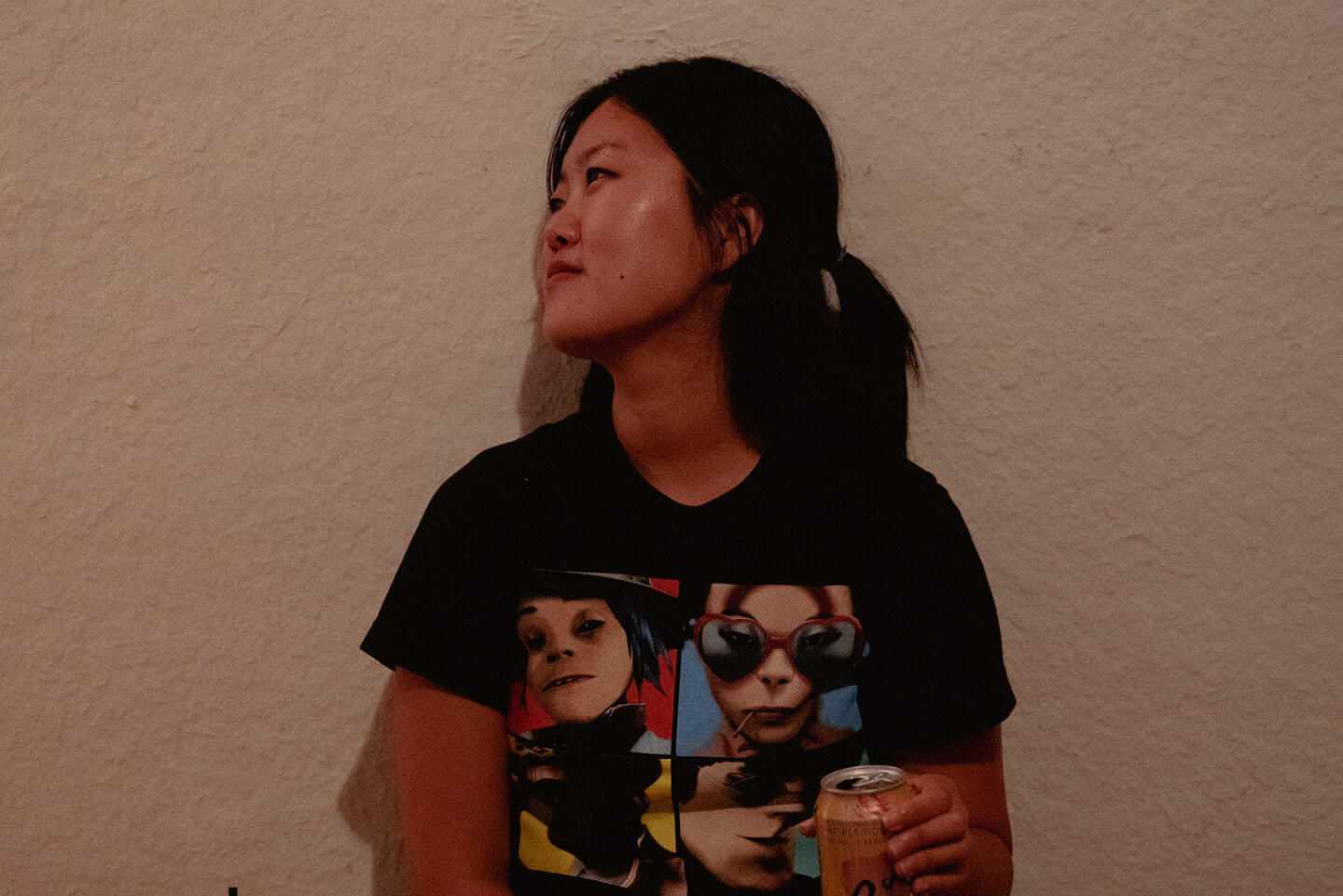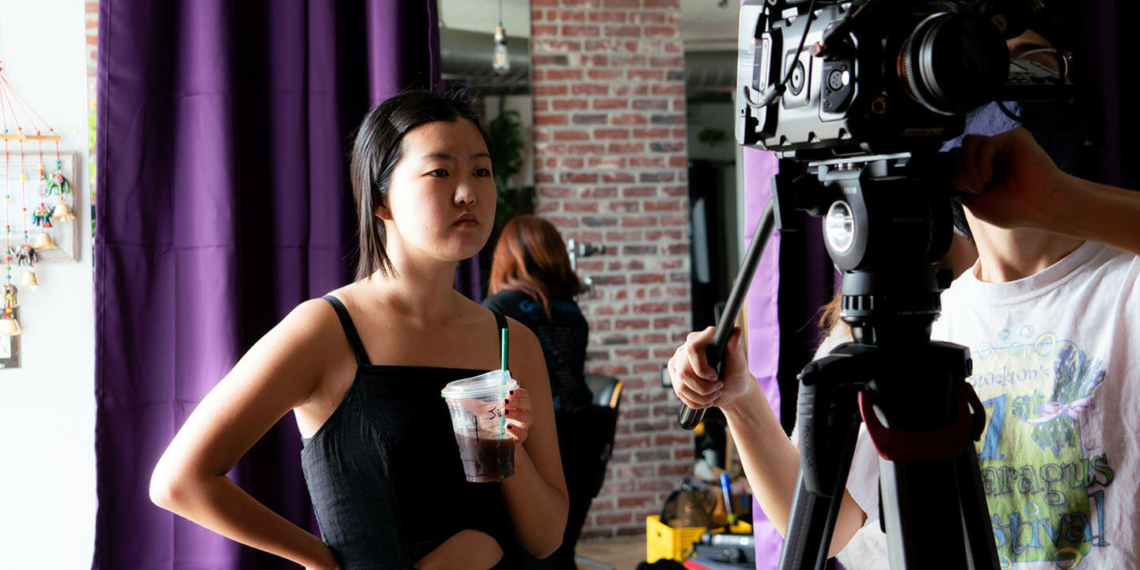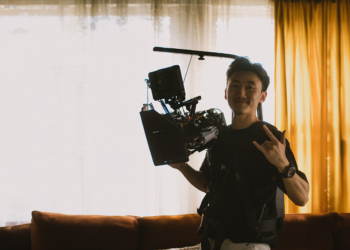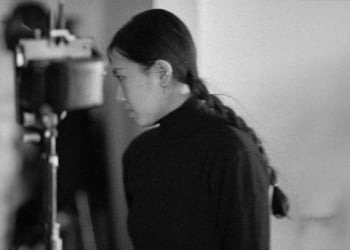In a realm where cultures intersect and personal stories unfold into cinematic masterpieces, Jiwon Lee stands as a beacon of storytelling finesse. With a life journey that meanders through Korea, Malaysia, China, and now Los Angeles, Lee embodies the essence of a transnational storyteller. Her unique perspective on multiculturalism and the Asian female experience has not only enriched her screenwriting but has also captivated audiences worldwide. In our exclusive Indie Shorts Mag interview, Jiwon Lee offers a glimpse into the riveting world of her creations, from the award-winning “Call for Cassie” to her heartfelt memoir, “The Third Culture Teen“. Lee’s reflections on her path, her work as a showrunner’s assistant on “XO, Kitty“, and her ventures into translating for cinema legends, unfurl a tapestry of dedication, diversity, and creative insight.
Indie Shorts Mag: Jiwon, your background is incredibly rich and diverse, having been born in Korea, raised in Malaysia and China, and now based in Los Angeles. How has this transnational upbringing influenced your storytelling, particularly in exploring the themes of multiculturalism and the Asian female experience in your works?
Jiwon Lee: Hi! So honored to be speaking with you today. My multicultural background really was the start of storytelling for me; so in short, it was the root of my journey as a writer and storyteller. Growing up between different countries meant you always had to adjust to the culture of your host country. I always had to keep up with the television shows or the pop culture that kids at school would talk about rather than bring up what I used to know, which was no longer relevant in my new environment. I think always having to adjust and concede fostered this very primal urge to want to tell MY story from MY point of view, which eventually led me to want to become a screenwriter. I appreciate the opportunity to be able to share my stories with an audience now, as me discussing my own upbringing and emotions, touching upon multiculturalism and the Asian female experience, also seems to satisfy an urge in my audience as well. Truly a healing power of filmmaking and storytelling!
Indie Shorts Mag: Your film “Call for Cassie” has received global recognition, including screenings at prestigious festivals such as the LA Asian Film Festival and Diversity in Cannes Short Film Showcase. Could you share with us the inspiration behind this film and the process of bringing it to the screen?
Jiwon Lee: For sure! I draw a lot of my stories from personal experiences. ‘Call for Cassie‘ is one of them. One of my favorite hobbies when I used to live in China was receiving cheap massages at a nearby massage shop. I’ve always found my interaction with the masseuses there to be so fascinating, because we wouldn’t talk much or knew much about each other, but at the same time, we were sharing such an intimate moment, with me literally naked in a secluded room. After my time in the US, I thought back to that moment and how that weird complexity of the massage was the perfect metaphor for immigrant, who at once, is so close to yet so distant from the rest of the population. I was very fortunate to find other crew members and supporters who connected with the story and was able to bring the film to the big screen through crowdfunding!

Indie Shorts Mag: Having your scripts “Ride or Die” and “Jin’s Sashimi” qualify for the second round at the 30th Austin Screenplay & Teleplay Competition is quite an accomplishment. What key messages or themes were you hoping to convey through these scripts, and what was your reaction upon receiving the news of their qualification?
Jiwon Lee: I was absolutely thrilled! I’ve heard from the festival that having two scripts qualify for second rounder was a first, so I was very honored by that recognition. It was also interesting because those two scripts had very different tones and themes. ‘Ride or Die‘ is a gritty thriller/drama about a group of strangers who try to commit communal suicide together, while ‘Jin’s Sashimi‘ is a more quiet drama about a Korean mother-daughter relationship. The two do share similarities in that they feature Korean culture (which I always love to include) and convey how human relationships can both break and heal people.
Indie Shorts Mag: With your recent work as the showrunner’s assistant for the Netflix series “XO, Kitty,” what has been the most impactful lesson you’ve learned about the television industry, and how has it shaped your approach to writing and directing?
Jiwon Lee: Having worked at a writers room for the first time through ‘XO, Kitty,’ I think my biggest lesson was that there are so many steps and people involved in bringing a major streaming series to life. Even as a writer or even a showrunner, you are only a part of one creative process, and so much of other creatives’ — crews, cast, executives — decisions contribute to the final product. This was quite a new experience for me, as I’m more accustomed to the indie world in which we only need the creative input and opinions from a small number of people. It really taught me that to be a working writer/director you need to be flexible, and learn to not be too “precious of your babies,” as the process is so much larger than just your own ideas.
Indie Shorts Mag: Your memoir “The Third Culture Teen” deals with the nuances of “adulting” in the United States as a Third Culture Kid. In what ways do you hope your book resonates with readers, especially those who share similar backgrounds?
Jiwon Lee: My memoir truly started as a self-exploration journey for myself. There are already so many great publications out there about TCKs (or Third Culture Kids) which refer to people who have spent a majority of their developmental years outside of their passport country. The interesting thing was that while I was fine growing up as a TCK, trying to adult when you’re surrounded by non-expats and non-TCKs was a completely different experience. I had a hard time adjusting to college, living by myself in a foreign country for the first time. I wanted to find validation and explanation for my experience by researching and interviewing other TCKs who were older and wiser than me. The process of writing and researching itself really healed a broken part of me, so I hope it does the same for others who are struggling with the same questions.
Indie Shorts Mag: Your role as an industry translator, including working for global auteur Park Chan-wook and actor Song Kang-ho, is quite distinctive. How do you navigate the challenges of translating not just language but also cultural nuances, especially in the context of global cinema?
Jiwon Lee: I was very fortunate that my first translating experience started with Director Park, who is so very obviously an intelligent, brilliant person with decades of working globally as a filmmaker. All I had to do when I first started working was to make sure I was meeting up to his standards, which involved translating everything as precisely as possible, word-for-word. While this is easier said than done, it also took some pressure off of me, knowing that what this person was saying was already the best thing that could be said in the best way possible, and all I had to do was literally switch up the language. I think it also helped that I have a screenwriting and cinema studies background. Everything someone says is some form of a narrative, and pinpointing the beginning, middle, and end of what they are trying to convey, as if they are telling a story, has always helped me, in addition to my background in film studies, that gave me prior context of anything related to film and media.
Indie Shorts Mag: As a recent graduate of the University of Southern California’s School of Cinematic Arts, how do you believe your education has prepared you for the realities of the film and television industry? Are there any particular experiences or courses that have been pivotal to your development as a screenwriter and director?
Jiwon Lee: I think everyone from film school would answer the same thing, but as much as I loved what I learned at USC, it was really the people that made my education worth it. Most of my collaborators were other filmmakers I met at school, and we have continued to help each other post-graduation as people have started working in the industry. Discussing films together, working on films together, or simply just getting to know each other in a community of like-minded, talented cinephiles is an invaluable experience that you won’t get anywhere else. I also especially loved my screenwriting classes where I learned my eight sequence structure, and my film history classes, especially when we had a class on Kubrick and Lean. We had a huge theater on campus where I watched 2001 Space Odyssey and Lawrence of Arabia for the first time, and it’s an experience I’ll never forget.
Indie Shorts Mag: Considering your diverse career, from writing and directing films to translating for internationally acclaimed figures, what advice would you give to aspiring screenwriters and directors who are looking to make their mark in the industry?
Jiwon Lee: My number one advice would be to learn to tell YOUR story. In truth, every great story, every great film and TV have been done. It’s the PERSPECTIVE you bring into it that makes the story new. Likewise, whether you’re trying to find work as a writer, director, or really anything else in the industry, somebody is going to be asking you who you are, who your heroes are, and what kind of a story you want to tell. Be ready to know how to share your authentic self, story, and taste if you want to work in this crazy town!
Indie Shorts Mag: Could you share with us any upcoming projects or scripts you are currently working on, and what audiences can expect from your future works?
Jiwon Lee: I am currently in post-production for a short film I recently shot called ‘Human Evaluation,’ a 5 minute sci-fi short. I’m also working on writing a feature screenplay featuring a woman who turns into a giant snail! I’ve recently grown an interest in the genre space and would love to explore that more in my future works.
Indie Shorts Mag: Finally, reflecting on your achievements and the obstacles you’ve overcome, what does success mean to you in the context of the film and television industry, and how do you measure it personally and professionally?
Jiwon Lee: This is a hard question as I am constantly wondering about this myself. I think it would be both a personal and professional success for me if I know that something I’ve put out there has changed someone’s — even if it’s just one person — life in a meaningful way. This is something that can also be achieved outside of your career in the industry, which is why I always strive to leave meaningful marks on the people I interact with.
Jiwon Lee’s journey through the intricacies of film and storytelling is more than just a series of professional milestones; it’s a profound exploration of identity, culture, and human connections. As she continues to traverse the challenging terrains of the film and television industry, her work remains a testament to the power of perspective and the irreplaceable value of telling one’s own story. Whether through her exploration into sci-fi with ‘Human Evaluation’ or delving into deeper societal commentaries with her feature screenplay, Lee’s future endeavors promise to push boundaries and provoke thought. With each narrative thread she weaves, Jiwon Lee not only defines success in her terms but also inspires a generation of storytellers to do the same. In a world yearning for authenticity and depth, Lee’s voice emerges not just as a whisper but as a resonant echo of what it means to craft stories that truly matter.
















